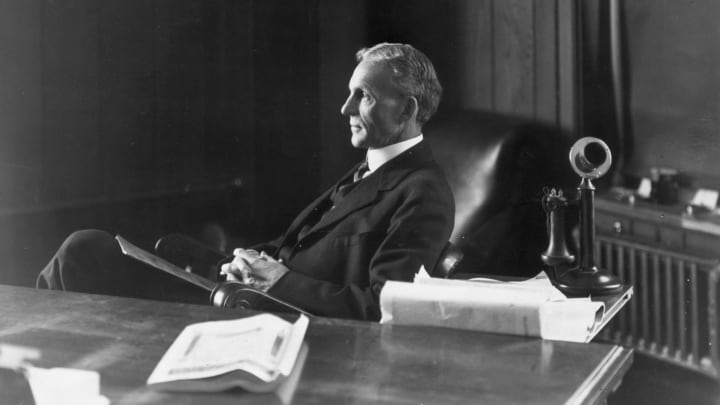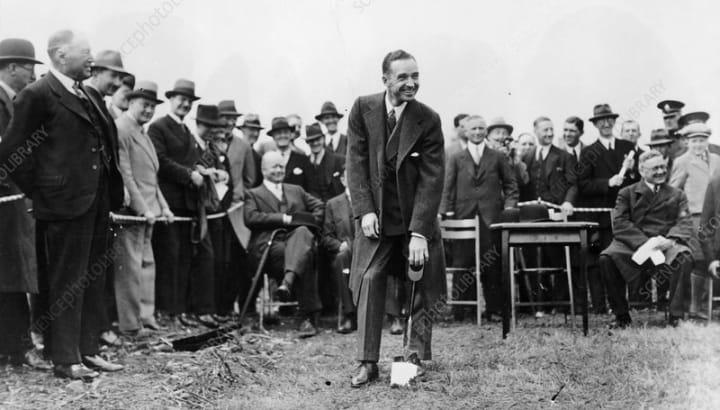
In 1879, a 16-year-old boy embarked on a journey from his father's farm to Detroit, a city where the notion of automobiles was still in its infancy. At the time, transportation primarily relied on trains and horse carriages, while the few existing automobiles were considered playthings for the wealthy. This young boy's name was Henry Ford, and little did the world know that he would soon establish a car company that would forever alter the landscape of the automotive industry.

Henry Ford's story began in Dearborn, Michigan, where he was born on July 30, 1863. His father, William Ford, owned a farm where the entire family worked tirelessly. As the oldest of six children, Henry was expected to assume responsibility for the family's farming business. However, he harbored no love for farming. "I never had any particular love for the farm; it was the mother on the farm I loved," he would later reflect.
Henry's aversion to traditional farming made it difficult for him to find contentment in school. He dropped out after only eight years of education and took a keen interest in machines and mechanics. He displayed a remarkable aptitude for repairing watches, earning a reputation as a skilled watch repairman.
At 12 years old, he received a pocket watch from his father and soon mastered the art of dismantling and reassembling it. He extended his expertise to repairing the watches of friends and family. His natural talent and curiosity laid the foundation for a lifelong fascination with mechanics.
The turning point came when young Henry, at 13, encountered a steam engine during a school trip to a Detroit company. This encounter sparked a deep passion for machines and mechanics, which became a defining element of his life. By the age of 15, he had constructed his first steam engine.
Tragedy struck when Henry lost his beloved mother, Mary Ford, to a sudden illness. This loss deepened his resentment for farming. Desiring a new direction, he left home at the age of 16, defying his father's wishes.
In Detroit, a city rapidly embracing industrialization, Henry immersed himself in the world of machines. His first job at the Michigan Car Company Works was short-lived, but he soon found employment at the James Flower and Brothers Machine Shop, working as an apprentice for a modest wage. To make ends meet, he also worked nights as a watch repairman, further honing his skills.
In 1882, Henry's journey led him back to his father's farm, where he immersed himself in the operation of a portable steam engine. He soon gained a reputation as a proficient steam engine operator, securing jobs for other farmers.
Word of his talents reached the Westinghouse Engine Company of Schenectady, New York, which hired him as a traveling mechanic to set up and service their steam tractor engines throughout southern Michigan.
In 1885, Henry met Clara Jane Bryant at a New Year's Eve party, and they became engaged the following year. As a wedding gift, his father gave him 40 acres of land. However, instead of using it for farming, Henry began experimenting with engines.
In 1891, Henry and Clara moved to Detroit, where he discovered an article in a British magazine about the gas engine. Intrigued, he pursued a job as a night engineer at the Edison Illuminating Company, a leading electric company in the city. This position allowed him to delve into the study of electricity.
In 1893, Henry and Clara welcomed their son, Edsel Bryant Ford. Henry's career flourished, and by 1896, he had completed his first gas-powered experimental car, the Quadricycle. Though crude, this marked the beginning of his journey to revolutionize the automotive industry.

The Detroit Automobile Company, founded in 1899 with financial support, was Henry's first attempt to create affordable vehicles for the masses. However, it faced challenges due to conflicting visions within the company, leading to its closure within a year.
Henry Ford shifted his focus to racing cars, gaining recognition for his innovative designs. In 1903, he founded the Ford Motor Company, which produced the Model A. Ford's assembly line revolutionized car manufacturing, and by 1913, he was producing vehicles at a remarkable rate.
The pinnacle of his success came with the Model T, introduced in 1908. It became a sensation and an affordable option for the common man, effectively transforming the automobile from a luxury to a necessity. Ford's innovative assembly line drastically reduced production time and costs.
By 1916, half of all cars on Earth carried the Ford name, an incredible feat. Ford's ideas not only reshaped the automotive industry but also influenced labor practices, as he introduced the concept of higher wages and shorter work hours.
Ford's legacy extends far beyond automobiles. He left an indelible mark on industry, engineering, and labor, showing that innovative thinking and unwavering determination could reshape the world.
Henry Ford's life journey from a farm in Michigan to revolutionizing the automotive industry is an inspirational testament to the power of perseverance and innovation. His impact on the world remains profound, as his vision and innovations continue to shape the way we live and work today.






Comments
There are no comments for this story
Be the first to respond and start the conversation.